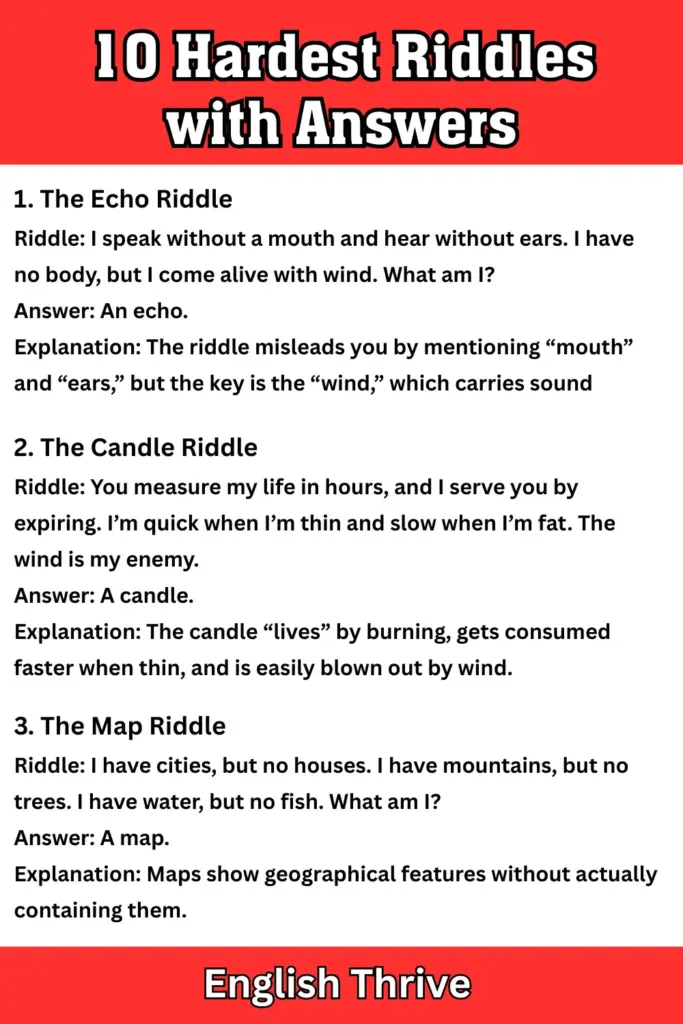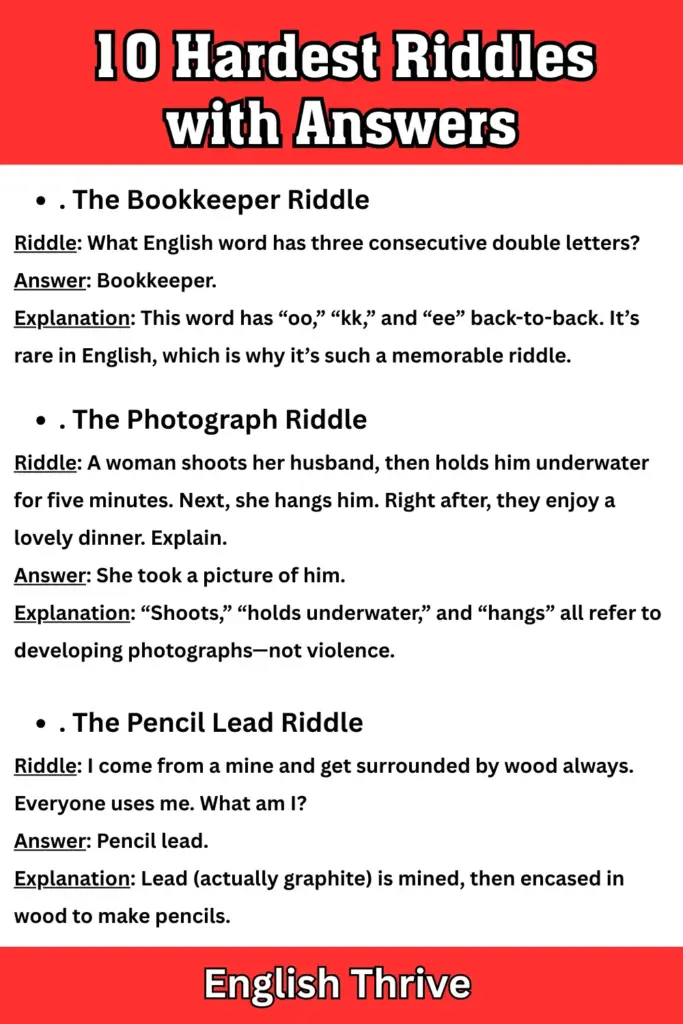Riddles are more than just clever word games—they’re a powerful way to sharpen the mind. For students, solving riddles helps develop critical thinking, problem-solving, and English comprehension skills. Unlike simple puzzles, hard riddles require you to look beyond the obvious, think laterally, and explore hidden meanings in language.
If you’re a student preparing for a quiz, a classroom competition, or simply looking to challenge your brain, this list of the Top 10 hardest riddles in the world with answers is the perfect place to start. Each riddle comes with an answer and a short explanation so you not only get it right but also understand the reasoning behind it.
So, are you ready? Let’s dive into the trickiest riddles that will make you think twice before answering!
Contents
ToggleTop 10 Hardest Riddles with Answers
1. The Echo Riddle
Riddle: I speak without a mouth and hear without ears. I have no body, but I come alive with wind. What am I?
Answer: An echo.
Explanation: The riddle misleads you by mentioning “mouth” and “ears,” but the key is the “wind,” which carries sound.
2. The Candle Riddle
Riddle: You measure my life in hours, and I serve you by expiring. I’m quick when I’m thin and slow when I’m fat. The wind is my enemy.
Answer: A candle.
Explanation: The candle “lives” by burning, gets consumed faster when thin, and is easily blown out by wind.
3. The Map Riddle
Riddle: I have cities, but no houses. I have mountains, but no trees. I have water, but no fish. What am I?
Answer: A map.
Explanation: Maps show geographical features without actually containing them.

4. The Letter “R” Riddle
Riddle: What is seen in the middle of March and April that can’t be seen at the beginning or end of either month?
Answer: The letter “R.”
Explanation: Instead of thinking about seasons or holidays, the answer lies in word structure.
5. The Married People Riddle
Riddle: You see a boat filled with people. It has not sunk, but when you look again you don’t see a single person on the boat. Why?
Answer: All the people were married.
Explanation: The trick is the word “single.” The riddle plays on double meanings to confuse you.
6. The Heroine Word Riddle
Riddle: What word in the English language does the following:
- The first two letters signify a male,
- The first three letters signify a female,
- The first four letters signify a great,
- The entire word signifies a great woman.
Answer: Heroine.
Explanation: “He” = male, “Her” = female, “Hero” = great, and “Heroine” = a great woman. This one is a lesson in how English words build meaning step by step.
7. The Bookkeeper Riddle
Riddle: What English word has three consecutive double letters?
Answer: Bookkeeper.
Explanation: This word has “oo,” “kk,” and “ee” back-to-back. It’s rare in English, which is why it’s such a memorable riddle.
8. The Photograph Riddle
Riddle: A woman shoots her husband, then holds him underwater for five minutes. Next, she hangs him. Right after, they enjoy a lovely dinner. Explain.
Answer: She took a picture of him.
Explanation: “Shoots,” “holds underwater,” and “hangs” all refer to developing photographs—not violence.
9. The Pencil Lead Riddle
Riddle: I come from a mine and get surrounded by wood always. Everyone uses me. What am I?
Answer: Pencil lead.
Explanation: Lead (actually graphite) is mined, then encased in wood to make pencils.
10. The Family Riddle
Riddle: A girl has as many brothers as sisters, but each brother has only half as many brothers as sisters. How many brothers and sisters are there in the family?
Answer: Four sisters and three brothers.
Explanation: It’s all about proportional counting. Each girl sees 3 sisters and 3 brothers, while each boy sees 2 brothers and 4 sisters.

Hard Riddles for Advanced Students
Here’s a quick table of extra brain-twisters for students who want more of a challenge:
| Riddle | Answer | Why It’s Tricky |
|---|---|---|
| What disappears as soon as you say its name? | Silence | It’s about concept, not objects. |
| How can the number four be half of five? | IV (Roman numeral) | Wordplay with numerals. |
| What gets wet while drying? | A towel | Contradiction-based riddle. |
| Which word in the dictionary is always spelled incorrectly? | Incorrectly | Plays on the meaning of the word. |
| What comes once in a minute, twice in a moment, but never in a thousand years? | The letter M | Literal word analysis. |
How to Solve Hard Riddles
Hard riddles can feel frustrating, but they’re also an opportunity to practice critical thinking and English comprehension. Here are some strategies students can use:
- Break the riddle into parts – Read each line carefully instead of rushing to the answer.
- Look for double meanings – Words like single, shoot, or keys often have more than one interpretation.
- Think literally, then figuratively – Many riddles use simple logic hidden in tricky wording.
- Eliminate impossible options – Narrowing choices can reveal the correct solution.
- Practice with friends or classmates – Discussing riddles improves problem-solving and communication skills.
FAQs about Hardest Riddles in the World with Answers
Q1. What are the hardest riddles with answers?
The hardest riddles are those that use wordplay and logical twists, like “What disappears as soon as you say its name?” (Answer: Silence).
Q2. How do riddles help students improve English?
Riddles force learners to understand context, multiple meanings, and sentence structure, making them excellent for vocabulary and grammar practice.
Q3. Which riddles are best for school competitions?
Short but clever ones like the “Letter R” riddle or the “Bookkeeper” riddle work best in quizzes and competitions.
Q4. Can riddles be used in exams or classroom practice?
Yes. Teachers often use riddles in warm-up activities, comprehension exercises, and critical-thinking tests.
Conclusion
Riddles are not just games—they’re tools for learning, thinking, and communication. The Top 10 hardest riddles in the world with answers for students that you’ve explored here combine language, logic, and creativity. By practicing them, students can strengthen their problem-solving skills, expand vocabulary, and learn to enjoy the playful side of English.
So next time you’re in class or with friends, try these riddles out—you might just surprise yourself with how sharp your brain really is!

